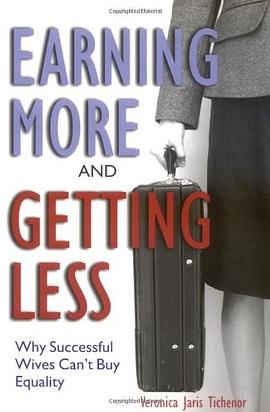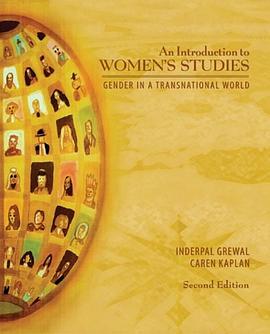
具体描述
"Tichenor provides another slam dunk against a simple, purely materialist explanation for male privilege in marriage. She shows us that even though money matters, women need an ideology of equality to draw upon to negotiate fairness in marriage."-Barbara Risman, co-chair, Council on Contemporary Families "Tichenor's research sheds light on the inner workings of families and helps us to clearly see the power of gender ideology and to understand how and why women's higher earnings can be a liability rather than a resource."-Beth Anne Shelton, professor of sociology, University of Texas at Arlington For nearly two decades the wage gap between men and women has remained virtually unchanged. Women continue to earn, on average, 80 cents for every dollar that men earn. Yet despite persistent discrimination in wages, studies are also beginning to show that a growing number of women are out-earning their husbands. Nationwide, nearly one-third of working women are the chief breadwinners in their families. The trend is particularly pronounced among the demographic of highly educated women. Does this increase in earnings, however, equate to a shift in power dynamics between husbands and wives? In Earning More and Getting Less, sociologist Veronica Jaris Tichenor shows how, historically, men have derived a great deal of power over financial and household decisions by bringing home all (or most) of the family's income. Yet, financial superiority has not been a similar source of power for women. Tichenor demonstrates how wives, instead of using their substantial incomes to negotiate more egalitarian relationships, enable their husbands to perpetuate male dominance within the family. Weaving personalaccounts, in-depth interviews, and compelling narrative, this important study reveals disturbing evidence that the conventional power relations defined by gender are powerful enough to undermine hierarchies defined by money. Earning More and Getting Less is essential reading in sociology, psychology, and family and gender studies. Veronica Jaris Tichenor is an assistant professor in the department of sociology at the State University of New York--Institute of Technology.
作者简介
目录信息
读后感
评分
评分
评分
评分
用户评价
总而言之,这本书给我带来的最大启发在于,它成功地将“省钱”的理念升级为了“生命价值的重新分配”。许多理财书籍侧重于“开源节流”,但这本书更像是在进行一场彻底的“价值审计”。它让我开始问自己一个更深层次的问题:我今天赚取的每一块钱,真正为我的“理想生活蓝图”贡献了多少比例?剩下的部分,是不是仅仅为了维持一个比我期望的更复杂、更耗能的生活结构?书中对“认知负荷”的控制策略,比如如何搭建信息过滤系统、如何设计最小化的“必要决策清单”,对我日常的决策效率产生了立竿见影的效果。阅读过程中,我时常会停下来,在笔记上画出复杂的流程图,试图将书中的理念转化为我个人的行动流程图。这绝对不是一本可以轻松翻阅的书,它要求读者投入心力去解构和重构自己的生活模式。对于那些厌倦了“努力工作却感觉原地踏步”的读者来说,这本书提供了一种冷静、理性且极其细致的反思路径,它不保证你马上会“挣到更多”,但它绝对能保证你更好地“掌控你所拥有的”。
评分读完这本书的中间部分,我感受到的更多是一种强烈的、甚至有些令人不快的“认知不适”。作者在探讨“价值获取”与“价值回报”的失衡时,他的论述角度非常犀利,直指那些看似光鲜的职业群体和消费行为背后的虚假繁荣。他用了一段非常精妙的比喻,将现代消费主义比作一场永无止境的“追逐回声的游戏”,我们拼命赚取更多的钱,只是为了去购买那些能让我们在社交圈中“暂时听起来更响亮”的东西,但本质上,这些支出只是对我们自身价值焦虑的无效填充。我特别欣赏他对“机会成本的复利效应”的分析。他不仅仅计算的是金钱上的机会成本,更是将注意力、情感能量以及人际关系的质量也纳入了计算模型中。例如,他详细分析了“参与无意义的跨部门会议”如何通过累积效应,在五年内让你错失掌握一项核心高价值技能的时间。这种对“软性资源”耗损的量化分析,远远超出了我读过的其他理财书籍的范畴。这本书的行文逻辑非常严密,但这种严密性也带来了一种近乎冷酷的客观性,让你不得不面对自己生活中那些“被美化的浪费”。说实话,读到“你的闲暇时间正被算法量化并售卖”那段时,我差点把咖啡洒出来,因为我突然意识到自己对短视频平台成瘾的代价。
评分这本书后半部分的基调,从前半段的批判性审视,转变为了一种更具操作性的“系统重构”引导。作者开始详细阐述如何建立一套能够有效“隔离外部噪音”的个人生活系统。这部分内容,与其说是教你赚钱,不如说是教你如何“守住已经获得的”以及如何“优化资源分配”。他提出了一个名为“最小化依赖矩阵”的概念,主张通过多样化收入来源(并非指投资多样化,而是指技能和时间投入的多样化)来降低对单一雇主或单一消费市场的依赖度。我尝试实践了书中关于“日程块的抗干扰设计”的建议,将每天早上九点到十一点定义为“绝对创造时间”,期间手机静音、邮件关闭,只处理最核心的认知任务。实践效果是惊人的,原本需要一整天才能勉强完成的深度工作,压缩到了两个小时内。更重要的是,这释放出了我的下午时间,让我能更从容地处理那些需要协作但无需高度集中的事务。这本书没有给我提供“一夜暴富”的幻想,但它提供了一种更为坚实的基础——一个不易被外界环境轻易击垮的个人运营体系。这种体系构建的细节描写,体现了作者深厚的实践经验,而非空洞的理论推导。
评分这本书的封面设计,坦白说,一开始并没有立刻抓住我的眼球。那种偏向保守的配色和字体选择,让它在书店的书架上显得有些低调。我拿起它,主要是因为封底的宣传语——它承诺提供一套“颠覆性的财务自由路径”。作为一个在职场摸爬滚打多年,深知收入增长与生活压力不成正比的普通人,我对此类口号总是抱持着一种谨慎的乐观。阅读的初期,作者的叙事风格非常平实,几乎像是在跟你分享他邻居家的理财故事,没有那种咄咄逼人的成功学味道。他花了大量篇幅去剖析“时间成本”在现代经济活动中的隐形价值,这一点令我印象深刻。他不是简单地告诉你如何投资股票或房地产,而是引导你重新审视你每天八小时工作之外的“闲置时间”究竟被哪些无效社交、信息过载和不必要的消费习惯偷偷抽走了。尤其是一章关于“最小有效行动集”的讨论,迫使我开始记录我一周内真正创造价值的活动,那种数据化的自我审视过程,说实话,有点刺痛,但也极其有效。他提出的“反向预算”概念,即先确定你能接受的“非必要开支上限”,再根据这个上限去规划收入结构,而非传统的先看收入再做预算的模式,这是一个微妙但强大的视角转换。这本书的价值不在于提供快速致富的秘籍,而在于提供了一套让你慢下来、看清楚自己“漏财点”的工具箱。
评分从文学角度来看,这本书的叙事结构是相当独特的。它采用了大量的案例研究,但这些案例并非那些白手起家的亿万富翁故事,而是聚焦于那些在收入数字上没有飞速增长,却在生活质量、心理健康和长期掌控感上实现质变的中层专业人士。其中一个关于“教师的职业曲线优化”的案例,让我感触极深。这位教师并没有辞职去创业,而是通过系统地将自己的教学内容模块化、产品化,并利用周末时间进行小规模的在线辅导,实现了收入的稳定提升,同时显著减轻了在校内应对繁琐行政事务的压力。作者在描述这个过程时,大量运用了工程学的术语来解释个人决策,比如“冗余度设计”、“反馈回路优化”等等,这使得整个阅读体验充满了一种智力上的挑战感。它让你感觉自己不是在读一本理财书,而是在阅读一本关于“高效能个体运营”的操作手册。最让我欣赏的是,作者对于“情感资本”的重视。他认为,对家庭、朋友和个人兴趣的投入,如果被视为一种投资,并且这些投资能带来情绪上的稳定和精神上的滋养,那么它们的回报率是无可替代的,这完全颠覆了传统成功学将所有时间都推向“工作”的单一导向。
评分主要结论就是标题,且作者认为这是一种家庭dyadic interaction的协同结果。研究的理论很弱,对半结构化访谈结果的推断有点过于随意。最好玩的其实是看穿插的访谈记录,要是访谈记录能单出一本书就好了。看到的几个有趣的点:1.妻子对丈夫说自己做了太多baby care的时候,丈夫说可你从来不遛狗呀,"The dog and the child are 'morally equivalent'"。2.各个家庭是怎么算账的,是通过联合账户对半开所有家庭开支,剩余的收入作为独立账户,自由支配呢;还是根据双方收入来负担家庭开支,多赚多付。最逗的是有一位妻子在访谈时说她们家的钱都在联合账户里,她觉得有些家庭设置独立账户的做法很蠢。而丈夫在访谈时直言不讳自己有一个独立账户,且他默认妻子也一样。
评分主要结论就是标题,且作者认为这是一种家庭dyadic interaction的协同结果。研究的理论很弱,对半结构化访谈结果的推断有点过于随意。最好玩的其实是看穿插的访谈记录,要是访谈记录能单出一本书就好了。看到的几个有趣的点:1.妻子对丈夫说自己做了太多baby care的时候,丈夫说可你从来不遛狗呀,"The dog and the child are 'morally equivalent'"。2.各个家庭是怎么算账的,是通过联合账户对半开所有家庭开支,剩余的收入作为独立账户,自由支配呢;还是根据双方收入来负担家庭开支,多赚多付。最逗的是有一位妻子在访谈时说她们家的钱都在联合账户里,她觉得有些家庭设置独立账户的做法很蠢。而丈夫在访谈时直言不讳自己有一个独立账户,且他默认妻子也一样。
评分主要结论就是标题,且作者认为这是一种家庭dyadic interaction的协同结果。研究的理论很弱,对半结构化访谈结果的推断有点过于随意。最好玩的其实是看穿插的访谈记录,要是访谈记录能单出一本书就好了。看到的几个有趣的点:1.妻子对丈夫说自己做了太多baby care的时候,丈夫说可你从来不遛狗呀,"The dog and the child are 'morally equivalent'"。2.各个家庭是怎么算账的,是通过联合账户对半开所有家庭开支,剩余的收入作为独立账户,自由支配呢;还是根据双方收入来负担家庭开支,多赚多付。最逗的是有一位妻子在访谈时说她们家的钱都在联合账户里,她觉得有些家庭设置独立账户的做法很蠢。而丈夫在访谈时直言不讳自己有一个独立账户,且他默认妻子也一样。
评分主要结论就是标题,且作者认为这是一种家庭dyadic interaction的协同结果。研究的理论很弱,对半结构化访谈结果的推断有点过于随意。最好玩的其实是看穿插的访谈记录,要是访谈记录能单出一本书就好了。看到的几个有趣的点:1.妻子对丈夫说自己做了太多baby care的时候,丈夫说可你从来不遛狗呀,"The dog and the child are 'morally equivalent'"。2.各个家庭是怎么算账的,是通过联合账户对半开所有家庭开支,剩余的收入作为独立账户,自由支配呢;还是根据双方收入来负担家庭开支,多赚多付。最逗的是有一位妻子在访谈时说她们家的钱都在联合账户里,她觉得有些家庭设置独立账户的做法很蠢。而丈夫在访谈时直言不讳自己有一个独立账户,且他默认妻子也一样。
评分主要结论就是标题,且作者认为这是一种家庭dyadic interaction的协同结果。研究的理论很弱,对半结构化访谈结果的推断有点过于随意。最好玩的其实是看穿插的访谈记录,要是访谈记录能单出一本书就好了。看到的几个有趣的点:1.妻子对丈夫说自己做了太多baby care的时候,丈夫说可你从来不遛狗呀,"The dog and the child are 'morally equivalent'"。2.各个家庭是怎么算账的,是通过联合账户对半开所有家庭开支,剩余的收入作为独立账户,自由支配呢;还是根据双方收入来负担家庭开支,多赚多付。最逗的是有一位妻子在访谈时说她们家的钱都在联合账户里,她觉得有些家庭设置独立账户的做法很蠢。而丈夫在访谈时直言不讳自己有一个独立账户,且他默认妻子也一样。
相关图书
本站所有内容均为互联网搜索引擎提供的公开搜索信息,本站不存储任何数据与内容,任何内容与数据均与本站无关,如有需要请联系相关搜索引擎包括但不限于百度,google,bing,sogou 等
© 2026 qciss.net All Rights Reserved. 小哈图书下载中心 版权所有





















